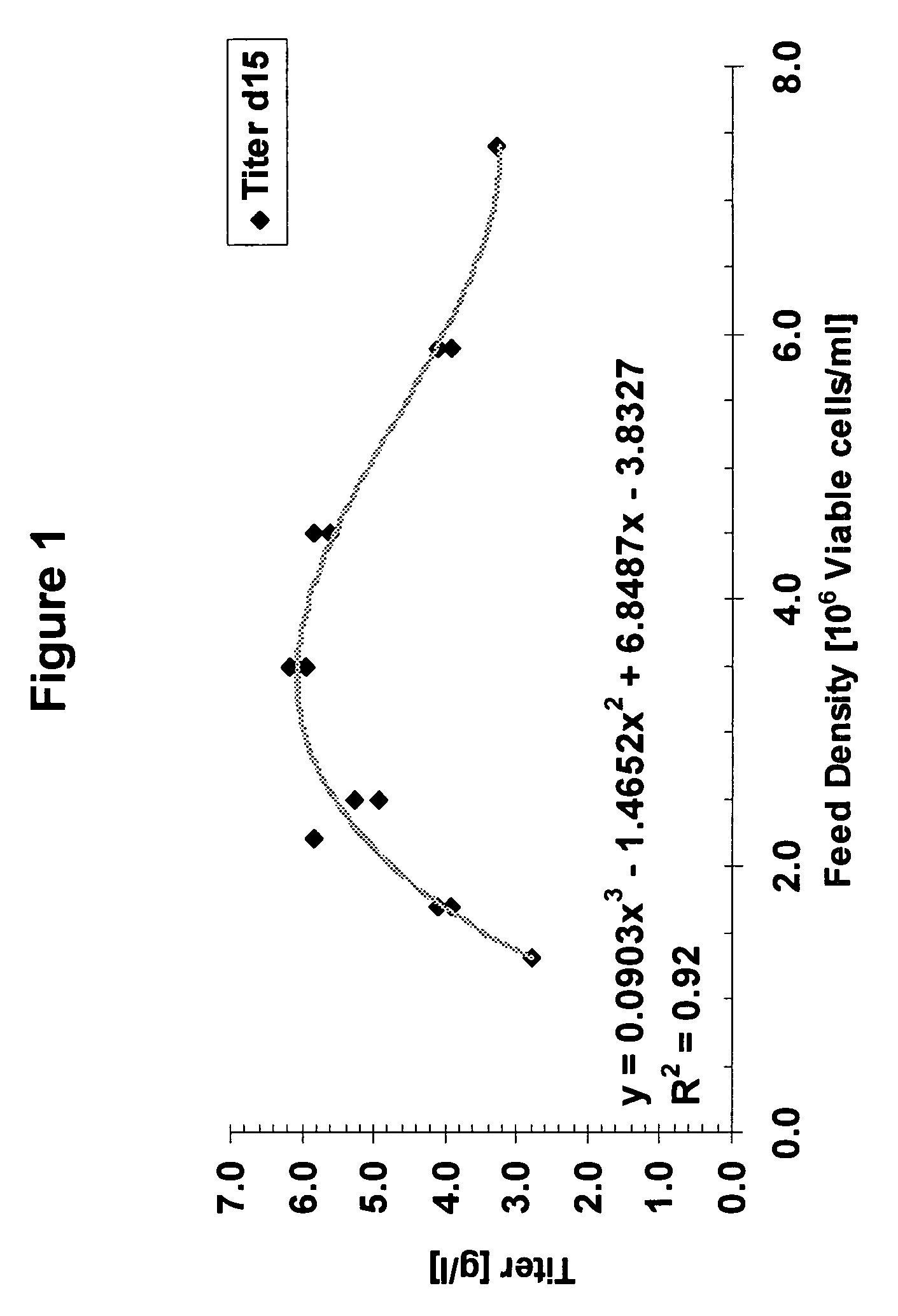Fed-batch cell culture methods using non-animal-based hydrolysates
a cell culture method and hydrolysate technology, applied in the field of fed-batch cell culture methods using non-animal-based hydrolysates, can solve the problems of insufficient enrichment of media formulations, achieve the effects of increasing the productivity of cho cell lines, increasing the final titer, and increasing the productivity
- Summary
- Abstract
- Description
- Claims
- Application Information
AI Technical Summary
Benefits of technology
Problems solved by technology
Method used
Image
Examples
example 1
Improved Media for Culturing Mammalian Cells
[0239]Typically mammalian, e.g, Chinese Hamster Ovary (CHO), cell culture media is based on commercially available media formulations, such as DMEM, Ham's F12, or combinations of these media types. For the production of proteins in mammalian cells, a cell culture medium must be sufficiently enriched to support increases in both cell growth and biologics product expression. The following example describes an improved biochemically defined medium for culturing mammalian cells, i.e., Chinese Hamster Ovary (CHO) cells to express various recombinant biologics, including antibodies.
[0240]Chinese Hamster Ovary (CHO) cells, deficient in dihydrofolate reductase [dhfr(−)] were adapted to grow in suspension in the absence of serum or any other material derived from an animal source. Cells were grown in the absence of hypoxanthine and thymidine, in defined cell culture medium obtained from a commercial source, JRH PF-CHO (Catalog #67147). Although the...
example 1.1
Medium for Chinese Hamster Ovary (CHO) Cell Culture
[0242]Generally, media formulations for culturing CHO cells were made up of three parts designated Parts A, B, and C. Part A was a basal medium and comprised water, amino acids, vitamins, inorganic metal salts, trace elements, ethanolamine, putrescine, a surfactant, sodium pyruvate, glutathione, and 2-Mercaptoethanol. Part B comprised an inorganic iron source; and Part C comprised recombinant growth factors, buffers, an osmolality regulator, an energy source, various non-ferrous metal ions, a surfactant, and hydrolysates. The medium components were mostly inorganic or from a recombinant source and were highly purified. The media did not contain proteins, lipids and carbohydrates from animal sources. Complex hydrolysates were obtained from highly processed yeast and plant sources.
[0243]Part A of the medium included protein-free CHO(PF CHO) medium (JRH—SAFC Biosciences; JRH Cat # 67147—also referred to as Original Part A). Thus, Part ...
example 1.2
Cell Culture Medium for Culturing CHO Cells Expressing Anti-TNF Alpha Antibody
[0269]CHO cell lines expressing a fully human antibody to TNFα (i.e., adalimumab; D2E7) were cultured in the cell culture media described in Table 2.
[0270]
TABLE 2Cell culture media for culturing CHO cells expressing fully human anti-TNF alphaantibodyAF-D2E7-AF-D2E7-AF and AY-AY-D2E7-AY-D2E7-1XP1XPD2E72XP2XPSR-SR-250SR-286SR-SR-248growth +production332333growthMTXprod_3XPgrowth 1growth 2Media ComponentsFinal pH:Component list: JRH Part A and7.2 ± 0.17.2 ± 0.17.2 ± 0.17.2 ± 0.17.2 ± 0.1Part BRaw MaterialFinal Osmolarity:ABC Components AddedSpecification #280-320280-320370-390320-360320-360Part A-: unmodified-original-RM-00316.4516.45NANANAcommercially availableSpecial (Modified) Part A: salt-freeRM-230NANA7.89 g / kg5.26 g / kg5.26 g / kgPart B: Ferric citrate: Chelated IronRM-00410 ml / kg10 mL / kg10 mL / kg10 mL / kg10 mL / kgsourcePart C:rHu Insulin: Recombinant ProteinSR-0552.0 mL / kg2.0 mL / kg6.0 mL / kg3.88 mL / kg3.88 mL / ...
PUM
| Property | Measurement | Unit |
|---|---|---|
| temperature | aaaaa | aaaaa |
| temperature | aaaaa | aaaaa |
| osmolarity | aaaaa | aaaaa |
Abstract
Description
Claims
Application Information
 Login to View More
Login to View More - R&D
- Intellectual Property
- Life Sciences
- Materials
- Tech Scout
- Unparalleled Data Quality
- Higher Quality Content
- 60% Fewer Hallucinations
Browse by: Latest US Patents, China's latest patents, Technical Efficacy Thesaurus, Application Domain, Technology Topic, Popular Technical Reports.
© 2025 PatSnap. All rights reserved.Legal|Privacy policy|Modern Slavery Act Transparency Statement|Sitemap|About US| Contact US: help@patsnap.com

